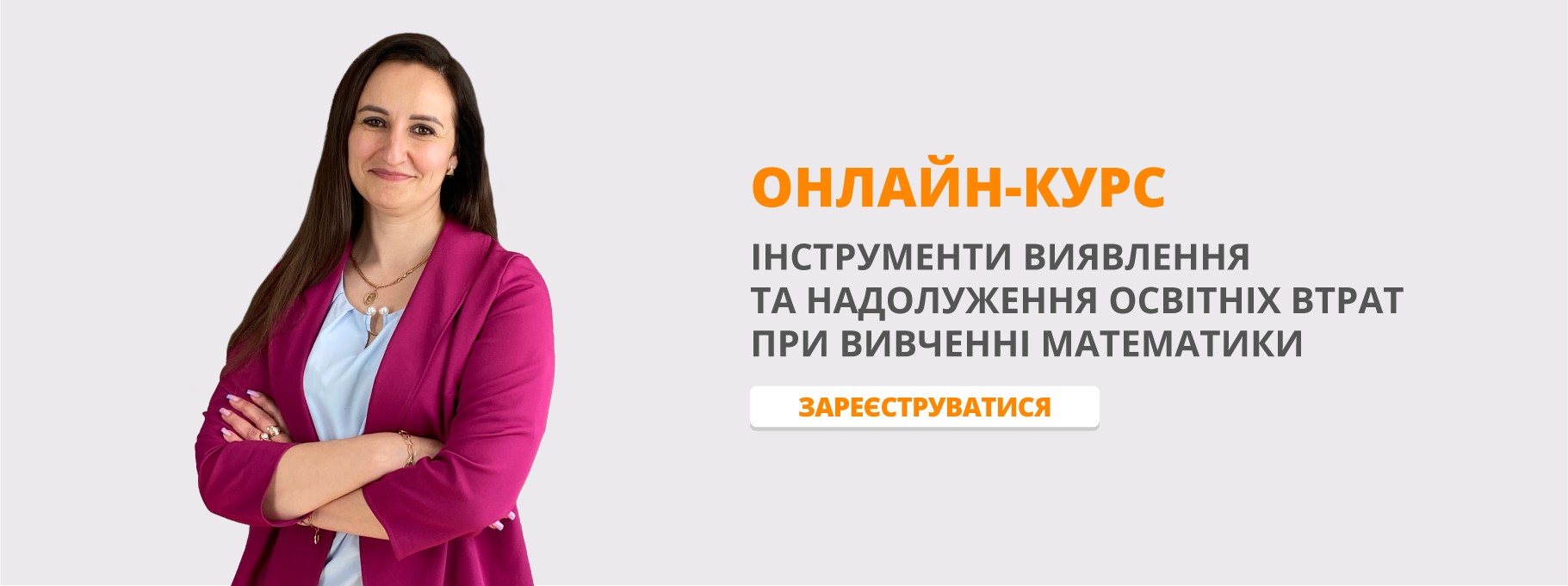Збірник граматичний вправ з англійської мови для учнів 5-9 класів
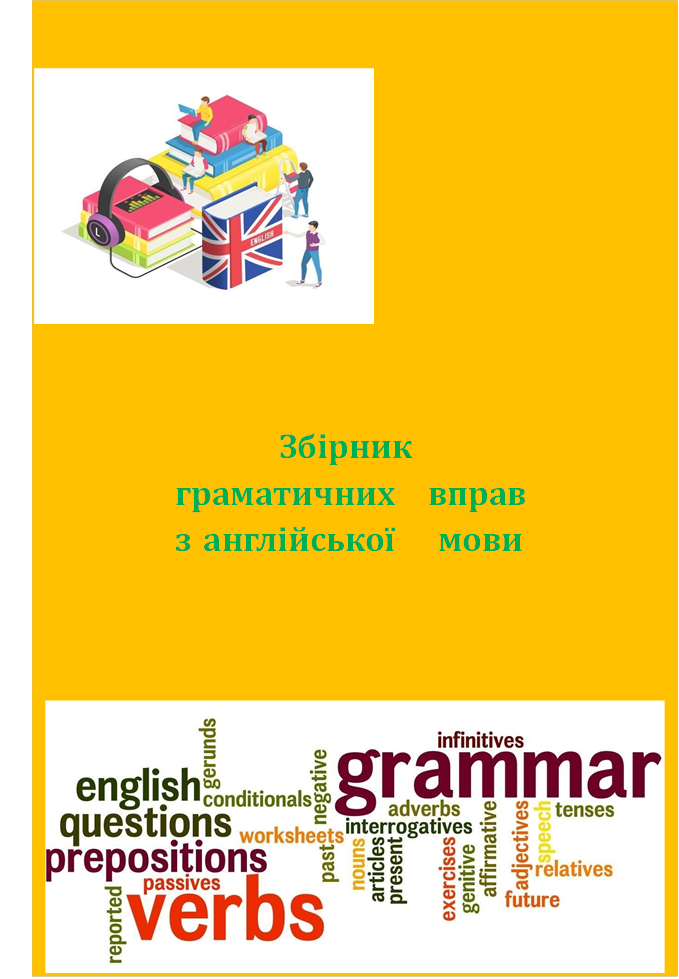
Відділ освіти соціально - гуманітарного управління виконовчого комітету
Богуславської міської ради Київської області
Шупиківської філії ОЗО Богуславський ліцей №2
Збірник граматичних вправ з англійської мови
для учнів 5-9 класів
Богуслав
2023
Збірник граматичних вправ з англійської мови [Текст]: для учнів 5 – 9 класів
/укл. О.А. Музиченко.- Богуслав, 2023.- 63 с.
Укладач: О. Музиченко, вчитель англійської мови, спеціаліст першої кваліфікаційної категорії Шупиківської філії ОЗО Богуславський ліцей №2
У збірнику розглядаються теми, зорінтовані на проведення уроків з англійської мови з учнями на базі знань, умінь та навичок з граматики.
Мета курсу – збагатити граматичний мінімум, розширити межі його активації, навчити учнів використовувати граматичні структури під час спілкування. Зміст збірника відповідає навчальній програмі, вміщує інформаційний матеріал з тем курсу, завдання для самоконтролю учнів.
Посібник рекомендований для учнів та вчителів навчальних закладів.
Зміст
Передмова
Головною метою навчання іноземної мови є формування комунікативної компетенції, основою якої є комунікативні уміння, сформовані на базі граматичих знань і навичок. Розвиток комунікативної компетенції також залежить від соціокультурних і соціолінгвістичних знань, умінь і навичок, які забезпечують входження особистості в інший соціум і сприяють її соціалізації в новому для неї суспільстві.
Даний збірник призначений для проведення занять з англійської мови з учнями 5-9 класів.
Основна мета курсу – збагатити граматичний мінімум, розширити межі його активації, навчити учнів використовувати граматичні структури під час спілкування. Робота з даним матеріалом передбачає також оволодіння таким граматичним матеріалом, який є необхідною передумовою для повноцінного активного володіння іноземною мовою.
Основну увагу зосереджено на розвиток граматичних навичок згідно робочої навчальної програми для учнів 5- 9 класів. Система вправ розрахована як для синхроного , так і для асинхроного навчання.
Курс складається з 20 тем, які сприяють практичному оволодінню англійською мовою, засвоєнню основних правил граматики та необхідного словникового запасу, розвиток навичок з граматики, усного мовлення та оволодіння навичками перекладу.
В основі навчання граматики лежить принцип випереджаючого усного засоєння граматичних структур через тренувальні прави з подальшим аналізом та використанням цого матеріалу у мовній практиці.
Збірник укладено згідно програмових вимог навчального предмету
«Іноземна мова»
Verb to be
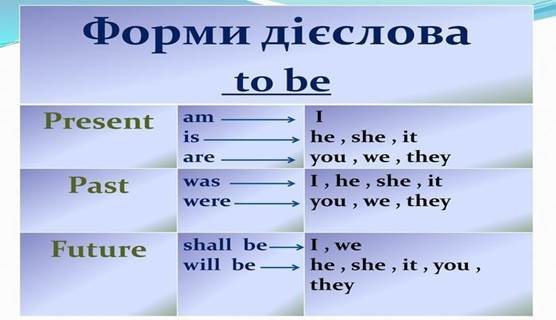
1. The verb to be. Insert appropriate present forms.
1. A: Hi, Alex. How (1) _ you?
2. B: Hello David. I (2) fine and how (3) you doing?
3. A: I (4) _doing fine.
4.  B: How (5) your sister? Where (6) _she now?
B: How (5) your sister? Where (6) _she now?
5. A: She (7) _ in London. She (8) ![]() learning English there.
learning English there.
6. B: Really? That (9) wonderful! How about your parents?
7. A; They (10) fine too. They (11) ![]() _ in Cyprus now.
_ in Cyprus now.
8. ![]() B: (12) you busy tonight?
B: (12) you busy tonight?
9. A: Not really, why?
10. B: We (13) ![]() having a party. Would you like to come?
having a party. Would you like to come?
11. A: I’d love to.
12. B: Then come to our place at 7:00 p.m.
2. Write in was / were
The third day Wednesday. The boys _ in the swimming-pool. Steve the fastest swimmer! On Thursday we ![]() at the circus! The bears
at the circus! The bears ![]() funny! The fifth day . In the morning we _ in the zoo.
funny! The fifth day . In the morning we _ in the zoo.
3. Write in is / isn’t, are / aren’t, am / ‘m not.
1. I _ lazy.
2. My friend naughty.
3.  My granny kind.
My granny kind.
4. My granddad clever.
5. My teachers funny.
6. I a bad pupil.
4. Write in was / were
1. Jenny at the party?
2. Lumpy quiet yesterday?
3. you in Kongo ?
4. your parents in the local gym yesterday?
5. your friend at school yesterday?
6. you happy yesterday?
5. Translate into English, using verb to be в Present Simple.
1. Чия це ручка? - Це моя ручка.
2. Де твоя ручка? - Вона в моєму пеналі.
3. Ці люди вчителі? - Ні, вони студенти.
4. Мій дідусь пенсіонер. Він не на роботі. Він вдома.
5. Його брат школяр. Він в школі.
6. Мій тато вчитель. Він хороший вчитель.
7. Її мама не медсестра. Вона лікар.
8. Ми не в кіно. Ми в театрі.
9. Вони дуже сильні і сміливі.
10. Я в саду. Тут багато гарних квітів.
11. Чий це кіт? - Це її кіт.
12. Де моя сестра? - Вона на роботі.
13. Чиї це олівці? - Це не мої олівці. Мої олівці на столі.
14. Погода чудова
Personal pronouns
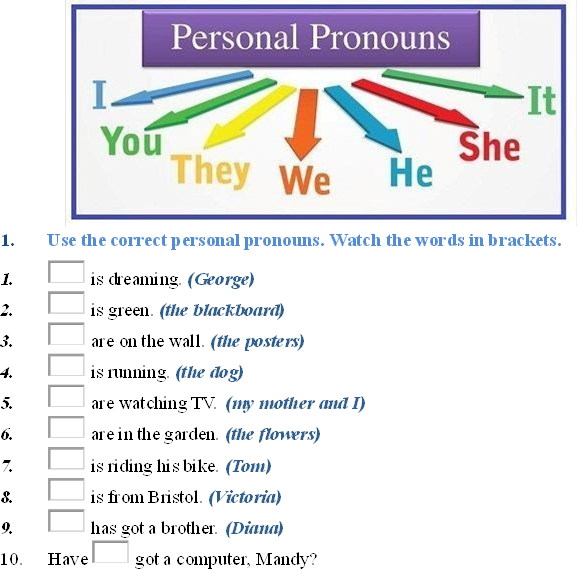
2. Replace the highlighted words with the appropriate pronouns:
1. I have a book.
2. My father loves my mom.
3. Our grandparents kissed my father.
4. My sisters and I bought a lot of new clothes.
5. I'll meet my brother at the airport.
6. You and your boyfriend will buy a house soon.
7. My group-mates don't like this professor.
8. I have a lot of nice and expensive clothes.
9. Where do you take the book?
3. Read the story. Find and circle all the pronouns.
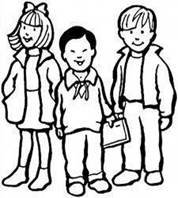 We are in our classroom. Olivia is sitting at the desk. She is reading. John is running. He likes running. Michelle is talking to her friend, Amanda. They are the best friends. Peter is watering flowers. He likes flowers. Susan, Gabriel and Nick are jumping. I want to jump with them! It is break now!
We are in our classroom. Olivia is sitting at the desk. She is reading. John is running. He likes running. Michelle is talking to her friend, Amanda. They are the best friends. Peter is watering flowers. He likes flowers. Susan, Gabriel and Nick are jumping. I want to jump with them! It is break now!
4. Circle the correct item.
1) Could you tell... the time, please?
a) I b) my c) me
2) This dog is ... .
a) she b) her c) hers
3) We left... things in the room of the hotel.
a) us b) our c) ours
4) Thomas often phones ....
a) they b) their c) them
5) Ann didn’t see .... at school yesterday.
a) you b)your c)yours
6) Pass me .... phone, please.
a) I b) my c) mine
7) John always has the driven license with ....
a) he b) his c) him
8) The ring is really beautiful, but. .. price is too high for me.
a) it b) its c) my
5. Complete the joke with the pronouns from the boxes.

In the Secret Service
Little Johnny was very proud of ... dog. ... was playing with ... when a passing gentleman stopped and asked ..... «What kind of dog is that, sonny?» «It is a police dog, sir!» «What! A police dog? .... doesn’t look like a police dog». «Oh, I know it», Johnny answered. «You see, sir, it’s in the secret service!»
6. Translate into English.
1) Він учора розповів нам про свої плани.
2) Я хочу повернути тобі твою книгу.
3) Ми зустрінемо їх завтра біля метро.
4) Вона бачила вас у лікарні минулого тижня.
5) Вчитель виправив наші помилки та повернув нам зошити.
6) Де мої черевики? — Вони під стільцем.
7) Ми покажемо їй наше чудове місто.
8) Я не зрозумів його слів та попросив його повторити запитання.
9) Вона не могла зателефонувати вам, бо загубила ваш номер.
10) Я щойно поклав олівець на стіл, але не можу його зараз знайти.
Possessive pronouns

1. Replace the personal pronouns with possessive pronouns
1. This laptop is (you) ![]() .
.
2. The book is (I) .
3. The black car is (we) ![]() .
.
4. The watch is (she) .
5. We met Ivan and Clara yesterday. This house is (they) .
6. The bag is (he) .
7. The paintings are (she) .
8. There is a bird in our garden. The nest is (it) .
9. This dog is (we) .
10. This hasn't been not my fault. It's been (you) .
2. Fill in the gaps
1. That pen belongs to those kids. That pen is .
2. This scooter belongs to my neighbor Vasya. This scooter is .
3. This hat belongs to my aunt Vera. This hat is .
4. This plant belongs to you. This plant is __.
5. This apartment belongs to me and my family. This apartment is .
6. These flowers belong to my mother. These flowers are .
7. Those photos belong to my sister's friends. Those photos are ![]() .
.
8. These tickets belong to you and your wife. These tickets are .
9. That suitcase belongs to me. That suitcase is .
10. That desk belongs to my aunt and uncle. That desk is .
3. Write on the place of omissions appropriate in meaning possessive pronouns.
1. I have got a dog. It is ![]() dog.
dog.
2. She has got a cat. It is _ cat.
3. We have got a car. This is car.
4. They have got a bike. This is bike.
5. He has got a key. It is ![]() key.
key.
6. You have got a toy. It is toy.
7. They have got a garden. This is garden.
8. We have got apples. These are _ apples.
3. Exercise
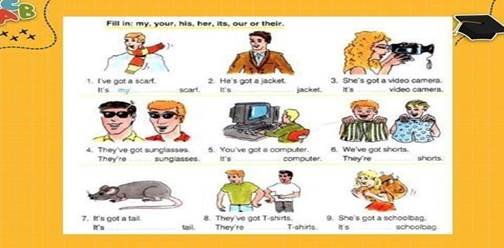
Cardinal and ordinal numbers
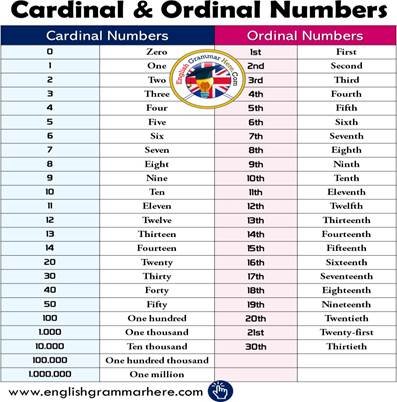
1. Look at the list of tenants of the house. Write, using ordinal numbers, who lives on which floor.
Example: Kelly lives on the seventh floor.
|
Floor 7 |
- |
Kelly |
|
Floor 6
|
- |
John |
|
Floor 5
|
- |
Diana |
|
Floor 4
|
- |
Peter |
|
Floor 3
|
- |
Sofia |
|
Floor 2
|
- |
Oliver |
|
Floor 1 |
- |
Amanda |
2. Use the correct words for the (numbers in brackets). Write the cardinal or ordinal numbers in word forms into the gaps.
1. I have breakfast at ![]() o'clock. (6)
o'clock. (6)
2. My brother is in the ![]() class. (6)
class. (6)
3.  Jamie is years old. (10)
Jamie is years old. (10)
4. Today is the of April. (10)
5. It costs only pound. (1)
6.I am so happy that he won the ![]() prize. (1)
prize. (1)
7.  It takes hours to get from London to Cairo by air. (5)
It takes hours to get from London to Cairo by air. (5)
8. It's the day of our holiday in Florida. (5)
9.  He scored goals in games. (3)/(2)
He scored goals in games. (3)/(2)
10.It was his goal in the last games. (3)/(2)
3. Decide whether the following words belong to Cardinal numbers or Ordinal numbers.
1. sixteen → ![]()
|
Ordinal number |
|
2. twenty-five →
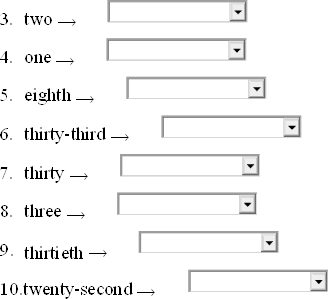
Adjective. Degrees of comparison
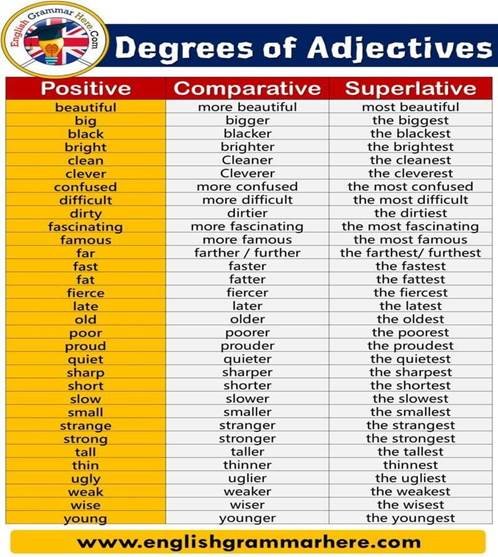
1. Make up the sentences and translate.
most – the Mona Lisa – in – is – painting – the – famous – the – world.
longer – the Don – is – the Volga – than.
more – Spain – Germany – than – beautiful – is. London – city – in – biggest – the – England – is. the – team – Adam – is – worst – the – player – in.
2. Form degrees of comparison of adjectives.
1. I am (tall) than my sister.
2. Daniela is ![]() _ (funny) than I.
_ (funny) than I.
3. London is ![]() _ (big) city in England.
_ (big) city in England.
4. Bicycles are ![]() (slow) than cars.
(slow) than cars.
5. I think this picture is (beautiful) than that picture.
6. A dolphin is _ (intelligent) than a whale.
7. The sea is (large) than a lake.
8. This book is (interest) I ever read.
9. A sports car is ![]() (fast) than a motorbike.
(fast) than a motorbike.
10. My English is ![]() (good) than yours.
(good) than yours.
3. Compare the months of the year using adjectives warm, cold, hot, rainy, snowy.
Example: May is warmer than January.
4. Read the suggestions, choose one of the suggested answer options
I bought a … dishwasher than I had.
• well;
• better;
• good; best;
This news is for today.
• the most joyful;
• joyfullest; more joyful;
This year we got … аpple harvest than last year.
• most; more;
• many.
There is … snow this winter than last.
• the least;
• more less;
• less;
• the most least.
Nicky is … dancer in the dance group.
• the best;
• better; more better;
• the most better.
Mike and I live … to school than our classmates.
• close;
• more closer;
• closest.
Let me carry your bag. It is … than mine.
• heavier;
• heavy;
• the most heaviest.
My daughter is … than Natalie.
• oldest; more oldest; more older.
The ladder was made … than we wanted.
• more wider;
• the most widest;
• wider;
• the widest.
My son is in the basketball team.
• the tallest;
• the tall;
• taller;
• the most tall
Noun. Plural of nouns
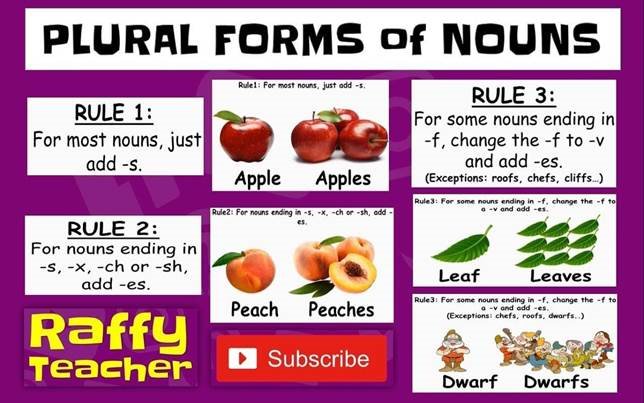
1. Form the plural of nouns.
1. thief -
2. fish - ![]()
3. cat - 4. carpet -
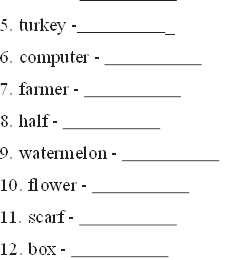
13. mountain -
14. kiss -
15.  smile -
smile -
2. Write down the correct form of the noun.
1. You can put (sugar) in your tea.
![]()
3. We have to buy new (furniture) .
4. I need to wash my (hair) _ .
5. We had lots of (fun) .
6. The Milfords have a lot of (money) ![]() _ _.
_ _.
7. How many (people) _ were at the cinema with you?
8. Could you give some (information) ![]() _ on your project?
_ on your project?
9. In this hotel, (family) are very welcome.
10. Those (man) seem to be very tired.
3. 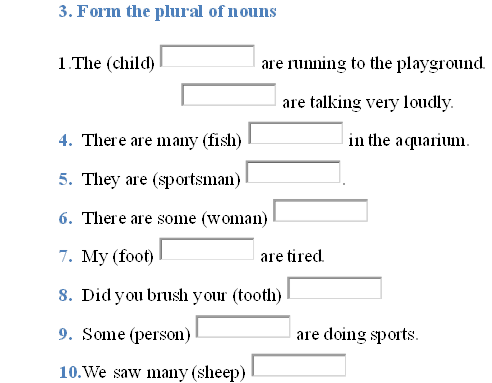 Those (man)
Those (man)
in the cafe.
?
in the mountains.
4. Form the plural of compound nouns . ady-bird →
 merry-go-round →
merry-go-round →
 forget-me-not →
forget-me-not →
passer-by →
mother-in-law →
car park →
grown-up →
editor-in-chief →
Articles
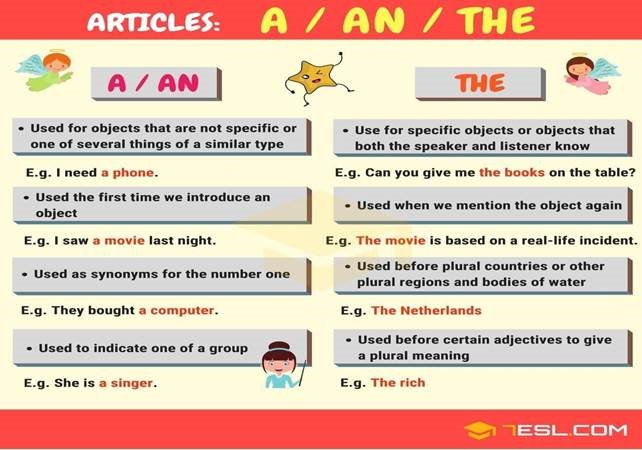
1. Insert article a/an
1. __ book
2. __ airport
3. __ honest boy
4. __ old friend
5. __ advice
6. __ hour
7. __ picture
8. __ bread
9. __accident
10 film
11. news
12. ![]() plum
plum
13. information
14. ![]() university
university
15. work
16. tomato
2. Insert the article where necessary
There is more water than land on our planet . (1)... largest and deepest ocean in (2)... world is (3)… Pacific, then comes(4) ... Atlantic.(5) ... Indian ocean is only (6)... little smaller. (7)... smallest ocean is (8)... Arctic.
(9)... longest river in (10)... world is (11)... Mississippi, (12)... largest sea is (13)... Mediterranean, (14) ... deepest lake is (15)... Lake Baikal.
Large masses of land are called (16)... continents. They are (17)... Europe and (18) …Asia, (19)... North and (20)... South America, (21)... Australia and (22)... Antarctica.
There are mountain chains in many parts of (23)... world. Some of them such as (24)... Urals are old, others like (25)... Caucasus are much younger. (26)... highest mountain chain, which is called(27) ... Himalayas, is situated in (28)... Asia.
3. These are geographical questions. Choose the correct answer, where you need to insert the article «The».
Alps, Amazon, Atlantic, Bahamas, Cairo, Kenya, Red Sea,
Asia, Andes, Pacific, Malta, Tokyo, Rhine, Switzerland, United States
1. is the capital of Egypt.
2. ![]() is between Africa and America.
is between Africa and America.
3. is a country in the middle of Europe.
4. is a river in South America.
5. is the largest continent in the world.
6. is the largest ocean.
7. is a river in Europe.
8. is between Canada and Mexico.
9. is in East Africa.
10. ![]() are mountains in South America.
are mountains in South America.
11. is the capital of Japan.
12. is an island in the Mediterranean.
13. ![]() are mountains in central Europe. 14 is between Saudi Arabia and Africa. 15.
are mountains in central Europe. 14 is between Saudi Arabia and Africa. 15. ![]() are a group of islands near Florida.
are a group of islands near Florida.
4. Insert an article if necessary
I have two … sisters. My … sisters are …students. 2. My … brother is not at … home, he is at …school. 3. I have thirty-two …teeth. 4. There is … tea in my … glass. There is no … tea in my … friend’s glass. His … glass is empty. 5. Where are your … books,
… boy? 6. The lecture is in … Room 332. 7. On … Saturday she usually goes to … cinema. 8. In … August he has his … birthday. … May is … fifth month of … year. 9.
Today is … ninth of … April. 10. …New Year and … Christmas are my … favourite holidays.11. I like … sport, especially … football and …tennis. 12. What do you do after … breakfast? – After…breakfast I go to … school.
Used to + infinitive
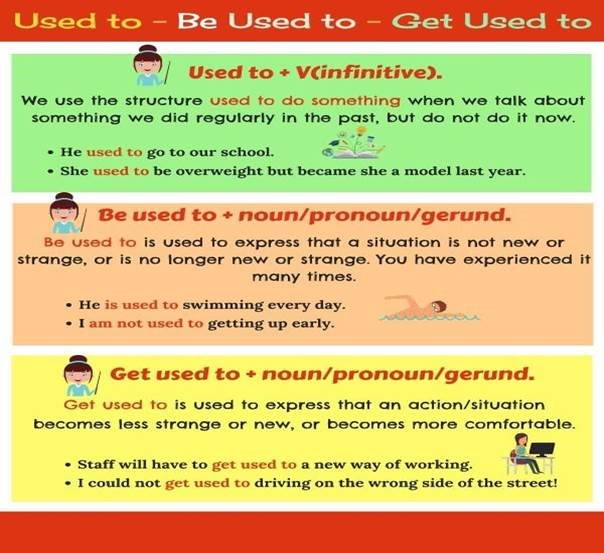
1. Open brackets using used to. People used to do it, now they don't.
1. People (draw) on the walls.
2. People (hunt) mammoths.
3. People (live) up to 30 years.
4. People (dress) in skins.
5. People (look) like monkeys.
6. People (think) that the sun revolves around the earth.
7. People (think) that gods ruled nature.
8. People (travel) in carriages.
9. They (dress) in armor.
1. They (fight) on horseback.
2. They (devote) ballads to their women. 3. They (write) books by hand.
2. Open the brackets into complex sentences. One part should be in Past Simple, and the other part should be in used to..
1. I (drink) orange juice but then I (have) an allergy on it.
2. You (study) English but then you (move) to Italy.
3. We (play) together but then John (go) to another school.
4. Mark (read) this book but then he (read) it.
5. Anthony (go) on foot but then he (buy) a car.
6. Angela and Susan (share) secrets but then they (argue).
7. Emily (like) rap but then she (change) her mind.
8. Romeo (be) unserious but then he (meet) Juliette.
9. Juliette (like) Patrice but then she (meet) Romeo.
10.Sherlock (think) that he was the best but then he (meet) a friend.
3. Choose the correct option.
1. I used to / am using to cook badly.
2. I am used to / used to play sports.
3. He used to / is use to ride a bike.
4. He is used to / used to wake up early in the morning.
5. I used to / am use to like to listen to rock music .
6. They are used to / used to doing exercises.
7. They used to / are using to studied harder.
8. She used to / is used to clean up the room.
9. We used to / are use to travel together.
10.I used to / am used to do makeup.
11.I used to / am use to eat cabbage.
12.He is used to / used to have a good life.
4. Write an essay about your childhood. Use expressions with actions that are not happening now.
Декілька порад:Не забувайте: то, що ви робили раніше, але не робите зараз – used to. Якщо ви раніше чогось не робили (не катався на велосипеді), але зараз це відбувається – did not use to.
Після конструкції used to завжди інфінітив.
Після did завжди інфінітив.
First Conditional
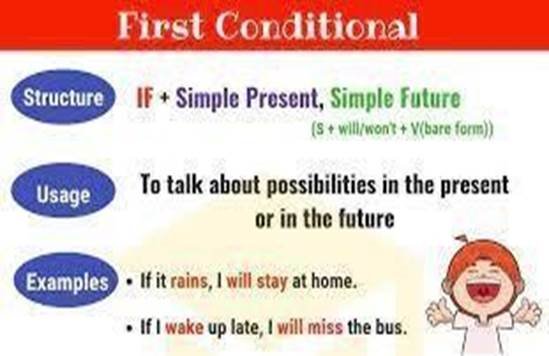
1. Complete the Conditional Sentences Type I.
1. If Caroline and Sue ..............................(prepare)the salad, Phil
................................(decorate)the house.
|
2. If Sue ................................(cut)the onions for the salad, |
Caroline |
||
|
.................................(peel)the mushrooms. |
|
|
|
|
3. Jane ................................(hoover)the sitting ..................................(move)the furniture. |
room if |
Aaron |
and Tim |
|
4. If Bob ...................................(tidy)up .........................................(clean)the toilet. |
the |
kitchen, |
Anita |
|
5. Elaine ................................(buy)the |
drinks |
if |
somebody |
....................................(help)her carry the bottles.
6. If Alan and Rebecca .................................(organise)the food, Mary and Conor .............................(make)the sandwiches.
7. If Bob ...................................(look)after the barbecue, Sue
...................................(let)the guests in.
8. Frank ..................................(play)the DJ if the others ...............................(bring)along their CDs.
9. Alan ............................(mix)the drinks if Jane .................................... (give)him some of her cocktail recipes. 10.If they all ..............................(do)their best, the party ............................. (be)great.
2.Complete the Conditional Sentences (Type I) by putting the verbs into the correct form.
1. If you (send) ............................this letter now, she (receive) ............................... it tomorrow.
2. If I (do) ............................this test, I (improve) .....................................my English.
3. If I (find) ................................your ring, I (give) ...................................... it back to you.
4. Peggy (go) ................................shopping if she (have) ........................... time in the afternoon.
5. Simon (go) ...............................to London next week if he (get) ..........................a cheap flight.
6. If her boyfriend (phone / not) ............................. today, she (leave)
................................him.
7. If they (study / not) ...........................harder, they (pass / not) ................................. the exam.
8. If it (rain) ..........................tomorrow, I (have to / not) .............................water the plants.
9. You (be able/ not) .........................to sleep if you (watch) ........................... this scary film.
10.Susan (can / move / not) ....................... into the new house if it (be / not) ......................ready on time.
3. Write verbs, using Conditional 1
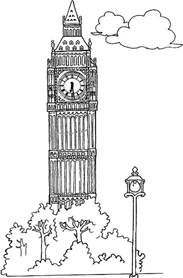
1. If he ![]() (travel) to London, he
(travel) to London, he
(visit) the museums.
2. We (not / have) a picnic if weather (not / improve).
3. If we (not / see) each other tomorrow, we ![]() (see) each other next week.
(see) each other next week.
|
4. If they |
(go) on holiday this summer, they |
(go) |
|
5. If it skiing. |
_ (snow) tomorrow, he |
(go) |
|
6. If I tired tomorrow. |
(not / go) to bed early, I |
(be) |
|
7. You / go) to bed soon.
|
(be) really tired tomorrow if you |
(not |
|
8. If the sun _ |
(shine), she |
(go) to the |
town.
9. I ![]() (be) so happy if I
(be) so happy if I ![]() (pass) the exam.
(pass) the exam.
10. If he (do) your homework now, he (be) free all day tomorrow.
Second Conditional
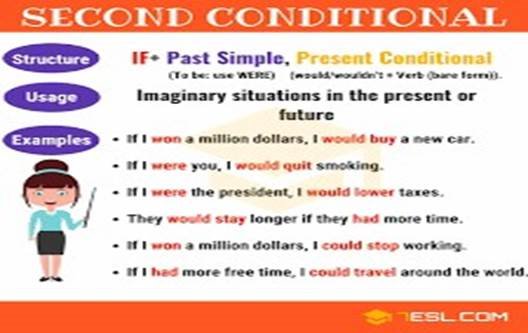
1. Make the Second Conditional
1. If I (be) you, I (get) a new profession.
2. If Katya (not / be) always so late, she (be) promoted to the senior position.
3. If I (speak) perfect English, I (have) a better paid job.
4. If Roma (pass) the exam, he (be) able to enter our college.
5. Sveta (be) happier if she (have) better friends.
6. We ![]() (buy) a house if we (decide) to live here for good.
(buy) a house if we (decide) to live here for good.
7. We ![]() (come) to the party if we (have) time.
(come) to the party if we (have) time.
8. Tanya (call) him if she (have) his mobile phone number.
9. Kirill __ (pass) the exam if he (study) harder.
10. We never (be) late again if we (buy) this new car. I promise.
2. Choose the correct option to form second conditional sentences.
1. No mother would have sent/would send a child to anything so awful if she is not/ were not in such misery herself!
2. I wouldn’t / mustn’t be surprised if we will turn / turned out to be ordinary humans, after all.
3. If Maggie looked/ would look out his eyes, would she / did she come away from the terrifying experience?
4. If the captain was / had shipwrecked, and you wanted/ want to rescue him in a boat, he would want / will want to know who was rowing the boat before he would get / got in.
5. The transfer will / would be easier if she would have /had no idea what was happening.
6. The East India Company can / could break Miguel’s control, if it can increase / increased the coffee amount on the market.
7. If my brother were / had to blame he will/ would ask your forgiveness.
8. If this could / was be arranged there will be/ would be nothing left for Chris to do.
9. It would look / will look as if we were / had been conspiring.
10.If it weren't / wouldn’t be for the pain and disgrace Sue would be / will be willing to end it all.
3. Translate the second conditional sentences into English.
1. Якби я був актором, я б це ненавидів.
2. Я б була дуже вдячна, якби ви дали мені яку-небуть чисту тканину, щоб зав’язати палець.
3. Біллі злився б ще більше, якби Моллі не заплакала.
4. Якби я навіть любила Грега, то ви б були останньою людиною, якій я би в цьому зізналася.
5. У нас було б більше шансів, якби ми були на острові.
6. Можна б було розібратися у всьому, якби люди говорили один з одним. 7
Third Conditional
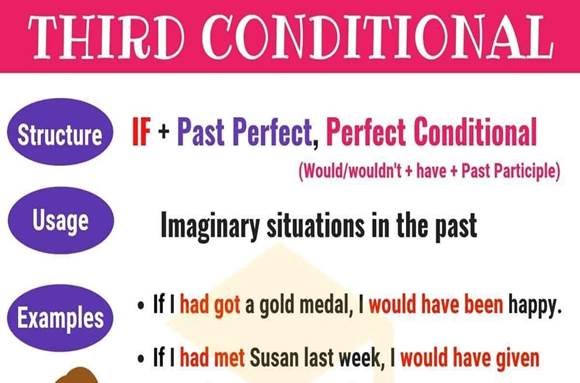
1. Put the verbs in brackets into the correct form (Conditional 3).
1. If the government (give) more money to the factory it
(not close).
2. If the government (build) flood barriers, we ![]() (not have) the floods last year.
(not have) the floods last year.
3. If Dan (know) how to swim, he ![]() _ (not drown).
_ (not drown).
4. If Molly![]() (listen) to the weather – forecast, she
(listen) to the weather – forecast, she
(know) it was going to rain.
5. If Greg ![]() (tell) me he was ill, I
(tell) me he was ill, I ![]() (be) more sympathetic. .
(be) more sympathetic. .
6. If she (prepare) for the exam, she ![]() (pass) it.
(pass) it.
7.  If Bill (see) the house, he ( not buy) it.
If Bill (see) the house, he ( not buy) it.
8. These words (roughly express) bob’s feelings, if he ![]()
(be) capable of reasoning.
9. But what ![]() _ (you do), if you
_ (you do), if you ![]() (see) what I saw
(see) what I saw
10. It (be) all done though, if Jill ![]() _ (help) at the right time.
_ (help) at the right time.
2. Do you ever think about what would or would not have happened if … ?
Make a chain story, using the following.
1. If I ![]() _ (not use) so much gas, I
_ (not use) so much gas, I ![]() (not have) such a big gas bill.
(not have) such a big gas bill.
2. If I ![]() _ (must not) pay my gas bill, I
_ (must not) pay my gas bill, I ![]() _ (not go) out in the rain.
_ (not go) out in the rain.
3. If I (not go) out in the rain, I ![]() (not catch) a cold.
(not catch) a cold.![]() If I (not catch) a cold, I (not carry) a handkerchief.
If I (not catch) a cold, I (not carry) a handkerchief.
4. If I (not carry) a handkerchief, I (not drop) it.
5. ![]() If I
If I ![]() _ (not drop) my handkerchief, Juan (not pick) it up.
_ (not drop) my handkerchief, Juan (not pick) it up.
6. If Juan_ ![]() (not pick) up my handkerchief, we
(not pick) up my handkerchief, we ![]() _
_
(never meet).
3. Rewrite the letter, using if-clauses (Third conditional).
Dear Магу,
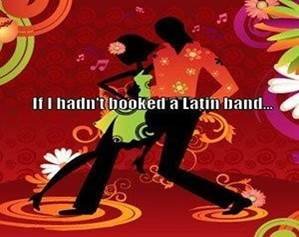
Phrasal verbs.
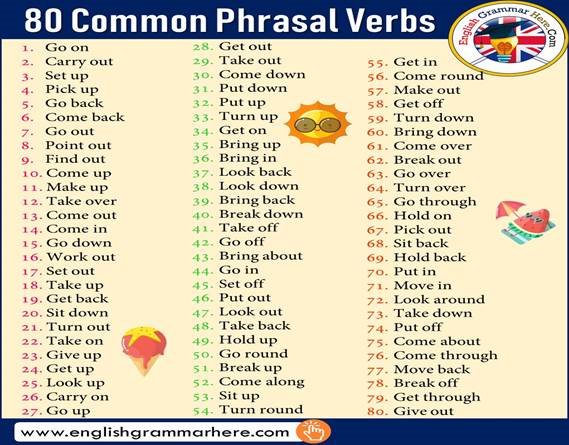
1. Match phrasal verbs with their definitions.
1 call out
2 call on
3 call at
4 call up
5 call back
6 call off
7 call for
a) to make a short visit to a person or a place.
b) to make a phone call, to order somebody to join the army, navy or air force.
c) to say something loudly or to shout in order to attract attention, to ask somebody to come, especially to an emergency.
d) to stop at the places mentioned (used about a train, a ship, etc.)
e) to demand or need something.
f) to return a phone call
g) to cancel something.
2. Complete the sentences with the correct phrasal verb.
call back, calling out, called off, called up, calls for, called at.
1. I heard someone …my name from a distance.
2. I … at the office to pick …my laptop before coming here.
3. He …me … to tell me the good news.
4. The bank manager said he would … after lunch.
5. The celebrations were … after the tragic accident.
6. The crisis … immediate action.
3. Translate into English.
1 Марк зайшов до Наомі, коли він був у місті.
2 Ми змушені були викликати лікаря вранці.
3 Я подзвонив Сему, щоб дізнатися, чи він хоче сходити в кіно.
4 Я передзвоню тобі як можна швидше.
5 Тобі доведеться передзвонити мені через деякий час.
6 Збори відмінили через страйк.
7 Вечірка, присвячена закінченню року, скасована директором школи.
8 В цьому рецепті потрібне молоко, а не вода.
Past Perfect Continuous
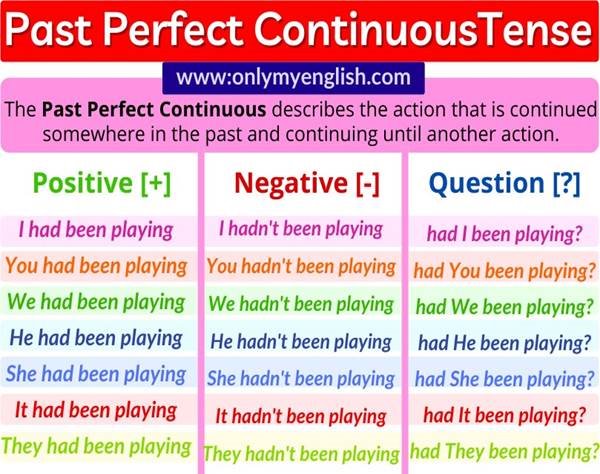
1. Put verbs in the Past Perfect Continuous.
1. Sally (type) this text for 3 hours before Mark came.
2. Anthony![]() (wait) for his airplane for 3 hours when its delay was announced.
(wait) for his airplane for 3 hours when its delay was announced.
3. I saw many huge puddles. it _ (rain) hard?
4. Sam did not even realize what a hard time Molly ![]() (have).
(have).
5. Rita(train) for a year and she was very fit when her ex-boyfriend met her.
|
6. Rachel’s husband |
(fix) the car since early morning. |
|
7. Paul and Molly _ |
(talk) on the phone for an hour when the line |
broke.
8. How long _ ![]() you_ (watch) TV before you decided to go to bed?
you_ (watch) TV before you decided to go to bed?
9. Steven felt tired as he (sail) for several hours.
10.Zina (try) to find her mother for years but she failed.
2. Make interrogative and negative sentences from the given sentences
1. Brian had been trying to find a better job for three weeks.
2. Little Johnny had been riding his new bike all day yesterday.
3. Robert and Frank had been fixing that computer for two hours yesterday.
4. Julia had been typing the report all the morning yesterday.
5. It had been raining all night last Tuesday.
6. The Smiths had been building their house for four years.
7. We had been skating for three hours yesterday.
8. You had been decorating the classroom for more than two hours last Saturday.
9. The twins had been fighting in the backyard when their mother saw them.
10. Molly had been speaking on the phone for an hour and a half yesterday evening.
3. Make up sentences using Past Perfect Continuous Tense
1. We/to wait/outdoors/for twenty minutes/before/he/opened the door.
2. What/Sally/to cook/when/you/came/home/ yesterday?
3. How long/you/to repair/your car/before/Nick/ started/to help/you?
4. Sarah/to collect/dolls/since/she/ was/a girl.
5. Where/they/to come/f rom/when/you/met/them/ yesterday?
6. Who/to sing/karaoke/all the evening/yesterday?
7. Greg/to study/for his final exams/all last month?
8. They/ to drive/for five hours/when/they/ran out of petrol.
9. Tony/ to sleep/for an hour/before/you/woke/him up.
10. Our chief/ to discuss/some affairs/with our business partners/for two hours/last Wednesday.
4. Find mistakes and correct them.
1. Ann had been done the ironing for two hours yesterday.
2. We had tried to catch a taxi for twenty-five minutes last Sunday before we managed to stop one.
3. Margaret had been not surfing the Net all day yesterday.
4. Nigel had being trying to get in touch with you for a week.
5. Had been they waiting for a bus for half an hour last Wednesday?
6. How long Nelly had been speaking on the phone yesterday?
7.Had Sue been sunbathing all day yesterday? — No, she had.
8.They have been dancing for more than an hour yesterday before Helen got tired.
9.Who had played the piano in your room from 3 to 4 o’clock yesterday?
10.Why had been crying your baby all the morning yesterday?
Future Tenses
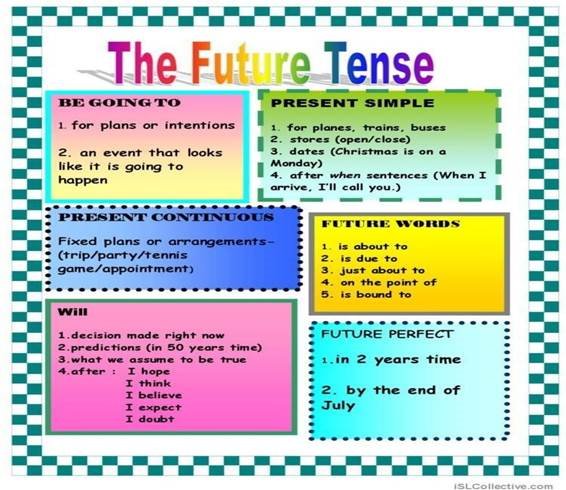
1. Make up the sentences using the Future Continuous Tense
1) Sue (to do) homework at 5 o’clock tomorrow.
2) We (to sunbathe) from 9 to 12 o’clock tomorrow morning.
3) Nick and Jack (to drive) to Berlin at this time next Monday.
4) You (to have) a conference from 3 to 5 o’clock tomorrow.
5) My cousin (to practice) in the gym at 7 o’clock tomorrow evening.
6) Nelly and Diana (to rest) in Hawaii at this time next week.
7) We (to dance) at the party all the evening tomorrow.
8) Kate (to visit) her grandparents all day next Saturday.
9) They (to prepare) to the wedding party all next week.
10) I (to travel) around Canada for two weeks next month.
2. Choose the right variant of the verbs and translate the sentences.
1. By the time Teddy comes home Pamela … (will eat/will have eaten/will be eating) all the apple jam.
2. It’s still not clear if the weather … (will change/will have changed/changes) for the better.
3. When Sandra enters a Design College she … (will study/will be studying/will have been studying) for Drawing 5 years there.
4. We … (will travel/will have travelled/will have been travelling) to lake Baikal in 2 months.
5. She … (will be playing/will have played/will have been playing) tennis tomorrow afternoon.
6. My dear granny … (will become/will be becoming/will have become a pensioner by 2018.
7. When you come to the station I … (will wait/will be waiting/will have waited) for you by the central entrance.
8. By the time he returns, we … (will starve/will have starved/will have been starving) here for 3 days!
3. Put the verbs in Future Simple, Future Continuous, Future Perfect or Future Perfect Continuous.
1. I … in Brazil at this time next year.
2. Dad … in the garden next Sunday.
3. By next Monday she … here for one month already.
4. In May our Ukrainian teacher … at our school for 30 years!
5. He … the report by that time.
6. We … the letters when you come.
7. Pearson … the contract tomorrow.
8. Ann … this book for two weeks the day after tomorrow. 4. Make questions and questions forms and translate.
1. We’ll have packed our luggage by the time the taxi comes.
2. The government will close the old jail.
3. My son will be meeting me at the airport at 8 on Tuesday.
4. I’ll go roller-skating next weekend.
5. Bob will have left India by this time tomorrow.
6. By 2050 they’ll have been living in the country for forty years.
7. The baby will be sleeping at 9 tonight. 8. They’ll have been working for this company for 10 years next September.
4. Do the test 1. 'Do you fancy going for a drink this evening?'
'I would like to but I _ my English homework.'
а) am going to do b) will do
c) doing d) will have done
2.'I'm afraid he's in a meeting. Could you call back in half an hour. They by then.'
а) will finish b) will have finished
c) are finishing d) going to
3. She ![]() _ to Paris on Friday for a conference.
_ to Paris on Friday for a conference.
а) is flying b) will have flown
c) will fly d) will be flying
4. 'Hi Tom. It's Jo.'
'Hi Jo. Can I call you back later? I out. I'm late for work.'
а) will be going b) am about to go
c) will go d) will have gone
5. Do you know who to the party tonight?
а) will have come b) will come
c) is coming d) will be coming
6. 'What this evening?'
'I'm going to the cinema with some friends.'
а) will you do b) will you be doing
c) are you doing d) will have you done
I'm feeling cold and tired. I think I a nice hot bath.
а) am going to have b) am having
c) will have d) will be having
8. He's really excited about going to university. The term ![]() next week.
next week.
а) starts b) will start
c) s starting d) will be started
9. Barcelona . They're three nil up already.
а) will win b) will have won
c) is going to win d) will be winning
10. Your wallet stolen if you put it in your back pocket.
There are pickpockets everywhere around here.
а) is going to be b) will be getting
c) is getting d) will
11. What are you going to do when the course ?
а) is finishing b) will finish
c) finishes d) be going to finish
12. The film ![]() at eight, so I'll meet you at the cinema at 7.45. а) is starting b) will start
at eight, so I'll meet you at the cinema at 7.45. а) is starting b) will start
c) starts d) will be started
Past Tenses
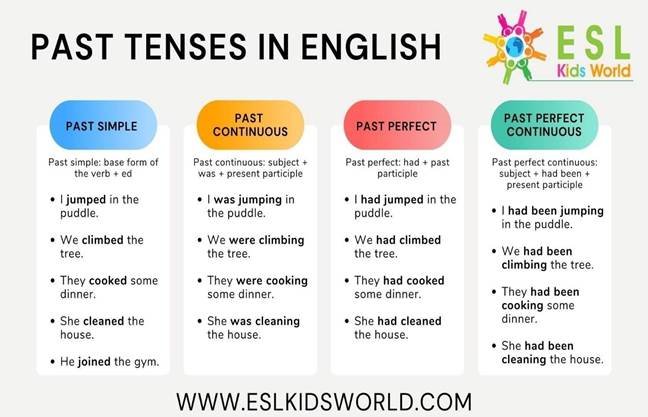
1. Match the tenses of the verbs, dividing by columns
then, when? (питання), when he came, when after) he came, before he came from 2 till 3, at 5 o’clock yesterday, by the time he came, yesterday, last night/ year, a week/month ago, in 1999, the other day, while, all day/ night/ morning, after, etc.
Past Simple Past Continuous Past Perfect
2. Open the brackets using the verbs in Past Simple або Past Perfect.
1. By two o’clock the teacher (to examine) all the students.
2. On my way to school I (to remember) that I (to leave) my report at home.
3. All my friends (to be) glad to hear that I (to pass) all the exams successfully.
4. Poor boy (to open) his eyes, (to look) around and (to try) what to remember (to happen) to him.
5. All the passengers (to see) at once that the old man (to travel) a lot in his life.
6. By the time we (to come) to see him, he (to leave) home.
7. During the holidays my friend (to visit) the village where he (to live in his childhood.
8. When they (to enter the hall, the performance already (to begin).
9. When I (to come) home, my mother (to go) shopping.
10. He (to study) French before he (to enter the university.
3. Open the brackets using the verbs in Past Simple, Past Continuous and Past Perfect.
1. By eight o’clock yesterday I (to finish) my work and at eight I (to play the piano.
2. By six o’clock father (to come) home and at six he (to have) dinner.
3. By nine o’clock yesterday grandmother (to wash) the dishes and at nine she (to watch) TV.
4. When I (to meet) Tom, he (to eat) an ice-cream which he (to buy) at the corner of the street.
5. When father (to come) home, we (to cook) the mushrooms which we (to gather) in the wood.
6. When I (to see) Ann, she (to look) at the flowers which she (to pick) in the field.
7. When I (to come) home yesterday, I (to see) that my little brother (to break) my pen and (to play with its pieces.
8. When I (to open) the door of the classroom, I (to see) that the teacher already (to come) and a student (to write) a test.
9. When I (to come) home my sister (to read) a book which she (to bring) from the library.
10. When mother (to come) home, the children (to eat) the soup which she (to cook) in the morning.
11. When I (to ring) up Mike, he still (to learn) the poem which he (to begin) learning at school.
12. When I (to look) out of the window, the children (to play with a ball which Pete (to bring) from home.
4. Test
1. He … a new car last month, but he doesn't really like it.
a) bought
b) was buying
c) had bought
2. I burned my finger while I … breakfast.
a) was cooking
b) had cooked
c) cooked
3. By the time I came back, Mike and Jane … , so I couldn't tell them about it.
a) were already leaving
b) had already left
c) left
4. He was waiting for his bus at the bus stop when the robbers … him. a) attacked
b) were attacking
c) had attacked
5. I wanted to ask my son for help, but I saw that he … , and I decided not to wake him up.
a) slept
b) was sleeping
c) had slept
6. Yesterday I went to an interesting museum that I … before.
a) didn't visit
b) wasn't visiting
c) hadn't visited
The Participle
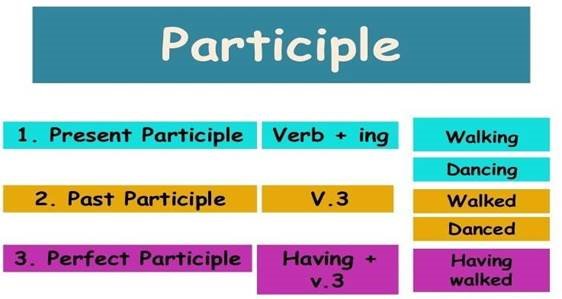
1. Use Participle I
1. All the people who live in this house are students. 2. The woman who is speaking now is our secretary. 3. The apparatus that stands on the table in the corner of the laboratory is quite new. 4. The young man who helps the professor in his experiments studies at an evening school for laboratory workers. 5. People who take books from the library must return them in time. 6. There are many pupils in our class who take part in all kinds of extracurricular activities.
2. Translate the sentences, using Past Participle (Participle II)
1. We stopped before a shut door. 2. They saw overturned tables and chairs and pieces of broken glass all over the room. 3. This is a church built many years ago. 4. The books written by Dickens give us a realistic picture of the 19th century of England. 5. A broken cup lay on the table. 6. The coat bought last year is too small for me now. 7. Nobody saw the things kept in that box. 8. This firm is interested in the purchase of automobiles produced by our plants.
3. Open the brackets and fill in with the proper participle.
1. He fell asleep (exhaust) by the journey.
2. She entered the dining room (accompany) by her husband and her father.
3. A snake (sleep) in the grass will bite if anyone treads upon it.
4. (Fill) his pockets with apples the boy was about to run away when he saw the owner of the garden with a stick in his hand.
5. It was a bright Sunday morning of early summer (promise) heat.
6. When I came home, I found the table (lay).
7. (Judge) by the colour of the sun it should be windy tomorrow.
8. (Arrive) at a big seaport, I started to look for a job.
9, He had received an urgent message (ask) him to telephone Sir Matthew.
10. He looked at groups of young girls (walk) arm in arm.
The Infinitive
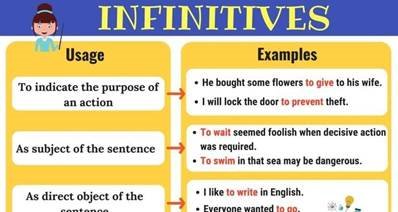
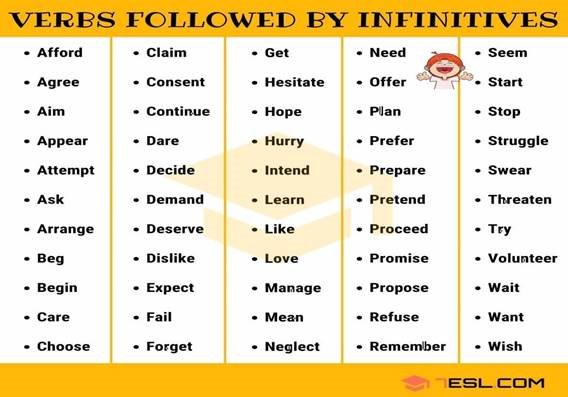
1. Use verbs into infinitive:
Дієслово Інфінітив
1. ![]() Met
Met
2. Waking
|
|
. |
|
|
3. Watches
|
|
|
|
4. ![]() Waited . 5. Wrote . 6. drives . 7. does .
Waited . 5. Wrote . 6. drives . 7. does .
|
|
8. sitting . 9. played ![]() .
.
|
|
|
|
10. rains .
2. Open the words in brackets, putting them in the infinitive or gerund form:
1. ![]() Dan enjoys (read) science fiction.
Dan enjoys (read) science fiction.
2. Cheryl suggested (see) a movie after work.
3. I miss (work) in the travel industry. Maybe I can get my old job back.
4. Where did you learn (speak) ![]() Spanish? Was it in Spain or in Latin America?
Spanish? Was it in Spain or in Latin America?

live there?
8. ![]() If he keeps (come) to work late, he’s going to get fired!
If he keeps (come) to work late, he’s going to get fired!
9. Debbie plans (study) abroad next year.
10.I agreed (help) Jack wash his car.
3. Choose the right variant
1. ![]() I can’t stand (complaining/her complaining/to complain) all the time.
I can’t stand (complaining/her complaining/to complain) all the time.
2. Our teacher won’t allow (us using/to use/us to use) dictionaries during the test.
3. We advised (him taking/him to take/his to take) ![]() a taxi instead of walking to the restaurant.
a taxi instead of walking to the restaurant.
4. The city doesn’t allow (to park/parking/my parking) ![]() along curbs painted red.
along curbs painted red.
5. She prefers (to make/making/my making) ![]() dinner because she doesn’t like to cook.
dinner because she doesn’t like to cook.
6. I hope you don’t mind (smoking/me to smoke/my smoking) ![]() while you eat.
while you eat.
7. John is never on time to work! I hate (arriving/his arriving/him to arrive) ![]() late every day.
late every day.
8. Sarah urged (to vote/me voting/me to vote) ![]() in the next election.
in the next election.
9. He needs to get a visa extension immediately. The authorities won’t permit (to stay/him to stay/him staying) ![]() in the country without a visa.
in the country without a visa.
10.Travel agents usually advise (to reconfirm/reconfirming/him reconfirming) ![]() flight bookings three days before departure.
flight bookings three days before departure.
Relative Clauses
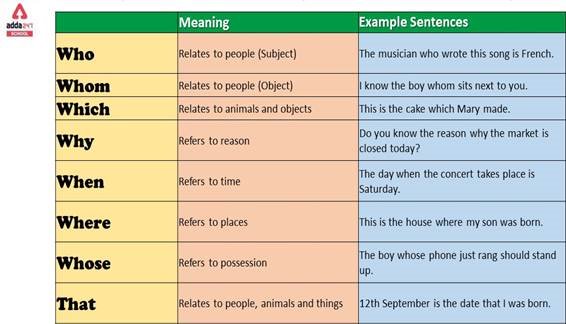
1. Make up sentences using who, which, that, when or where.
1. Here is the watch. I bought it yesterday.
2. This is the city. I have lived here all my life.
3. June is the month. A lot of people go on holiday then.
4. She is a student. She helps me with English.
5. Italy is the country. The best pizza is produced there.
6. 1939 was the year. The Second World War started then.
7. That was the winter. I met my best friend then.
8. That is the laptop. I won it in the competition.
9. She is my old friend. She went to school with me.
10.Bardi is an island. It has a lot of sandy beaches.
11.This is the man. His son is a good student.
12.I saw a film yesterday. It was fantastic.
2. Find the mistakes and correct it.
1. Yesterday we visited The Water Museum, who I`d never been to before.
2. My cousin, which is from Spain, is coming to visit us next week.
3. Do you see the dog where is lying on the floor?
4. This is the new book whose she bought last Sunday.
5. He is the man which writes a lot of stories.
6. Where is the magazine who I bought yesterday?
7. That is the hotel which we spent our holidays last summer/
8. I don`t like people lie.
9. People what don`t tell the truth really make me nervous.
10.They want to go to the beach which they can swim.
11.I don`t like films who have sad endings.
12.What` s the name of the woman which works at the café?
3. Join the sentences using relative pronouns.
1. Не is the man. He lives next door.
2. This is the picture. You presented to me last month.
3. These are the gloves. I found them on the train.
4. I met two actors. We watched them on TV show last night.
5. This is the house. My father built it many years ago.
6. The person got a reward. He took the lost wallet to the police station.
7. Where is the letter? I put it in the table.
8. This is the picture. I took it on holidays.
Passive Voice
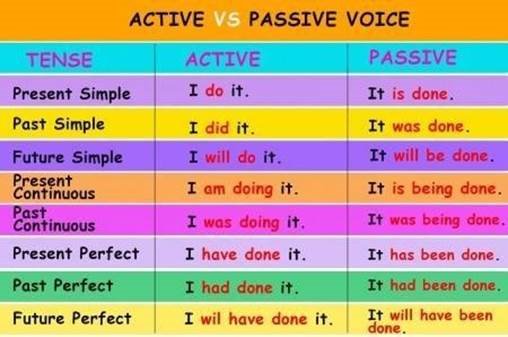
1. Transform the following sentences into Passive
1. I feed my cat 5 times a day.
2. My neighbours walk their puppy regularly.
3. You can book this accommodation at a reasonable price.
4. They gave him a discount.
5. She showed me her new photos.
6. The guide told a mysterious legend.
7. I could hear some strange noise.
8. They cancelled the meeting.
9. He sent the report yesterday.
10. I have just received a message from her.
11. The results of the tournament will show the winner. 12. I will inform them about the new schedule. 2. Put the verbs in brackets into the Present Simple Passive.
1) Thousands of calls ... (to make) from mobile phones every day. 2) Stars ... (to see) in the sky at night. 3) Coffee ... (to grow) in South America. 4) The news ... (to report) every day. 5) Animals in the zoo ... (to feed) three times a day. 6) Milk ... (to produce) by cows. 7) Computers ... (to use) in different spheres of modern life. 8) The Tower of London ... (to visit) by thousands of tourists every year. 9) This town ... (to situate) in the north of the country. 10) Famous pieces of Art ... (to keep) in museums.
3. Put the verbs in brackets into the Past Simple Passive and read the joke.
A Risky Test
A poor young artist ... (to ask) to paint a portrait of a rich lady. When the portrait ... (to finish), it ... (to show) to the lady’s friends. Some of them thought that it was too realistic id the artist ... (to suggest) to change some details in the portrait. But the artist didn’t want to change anything. Then one of the friends had an idea. «Let’s show the portrait to the lady’s dog and we’ll see if the picture is good or bad», he said, So the picture ... (to deliver) to the lady’s house and her dog ... (to bring) before the portrait. As soon as the dog saw the picture, it began to lick it all over. The lady ... (to please) and everybody congratulated the artist.
Word Formation
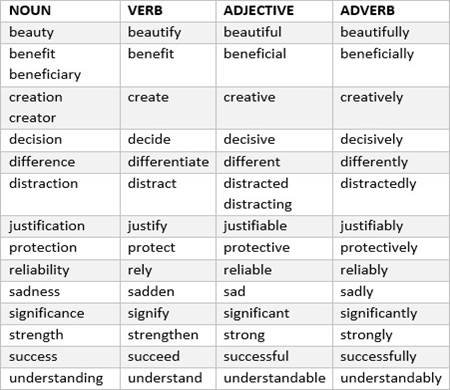
1. Read the text on an excursion to a museum. Use the words in brackets to form a new word that fits into each blank.
Last week, we went on a fantastic trip to the Museum of ![]() (NATURE) History,
(NATURE) History,
![]() which is (LOCATE) only a few blocks away from our school.
which is (LOCATE) only a few blocks away from our school.
On (ARRIVE) our guide was waiting for us and told us what we were going to see.
The most exciting part of the museum was the section on ![]() (HISTORY) animals. We stared in
(HISTORY) animals. We stared in ![]() (AMAZE) at all the skeletons of species that became extinct millions of years ago.
(AMAZE) at all the skeletons of species that became extinct millions of years ago.
There was a special ![]() (EXHIBIT) on dinosaurs, creatures that have fascinated us for a long time. The guide gave us some interesting facts about these
(EXHIBIT) on dinosaurs, creatures that have fascinated us for a long time. The guide gave us some interesting facts about these ![]() (GIANT) creatures. The Tyrannosaurus Rex, for example, reached a
(GIANT) creatures. The Tyrannosaurus Rex, for example, reached a ![]() (HIGH) of over 6 metres. The Seismosaurus was probably the longest
(HIGH) of over 6 metres. The Seismosaurus was probably the longest
dinosaur with an estimated ![]() (LENGTH) of up to 40 metres.
(LENGTH) of up to 40 metres.
The only ![]() (ADVANTAGE) of the trip was that there was not enough time to see all the interesting things the museum offered. Towards the end it got very
(ADVANTAGE) of the trip was that there was not enough time to see all the interesting things the museum offered. Towards the end it got very ![]() (CROWD) and our guide informed us that it would be better if we came during the morning hours.
(CROWD) and our guide informed us that it would be better if we came during the morning hours.
At the end of the tour, she thanked us for our ![]() (PATIENT) and attention and asked for feedback. She gave us a sheet of paper on which we could write down
(PATIENT) and attention and asked for feedback. She gave us a sheet of paper on which we could write down ![]() (SUGGEST) and
(SUGGEST) and ![]() (IMPROVE) for future school groups.
(IMPROVE) for future school groups.
After two hours in one of the most incredible buildings I have ever seen we went back to school.
2. Use the following endings : -age, -hood, -ation, -ion, -ful, -ence, -ency , -ness, -al,
-(er)y, -ment , - ety, -ism , -ity , -ing , -ior
1. I decided this. It was my
2. Don’t be so anxious. Control your
3. Ann’s a socialist. She believes in
4. 4We all want to be happy. We seek
5. We all agree. We’re all in
6. Who discovered this? Who made this ?
7. We’ll all arrive. We’ll be met on
8. ![]() I was a child then. It happened in my .
I was a child then. It happened in my .
9. She is absent. Can you explain her
10.I’ll post this. What’s the ?
3. Form nouns by adding the suffixes –ILITY , -ION and –MENT and making other necessary changes.
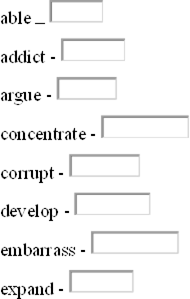
![]() improve - obsess - possible - replace - restrict - Список використаних джерел
improve - obsess - possible - replace - restrict - Список використаних джерел
1. Англійська граматика в таблицях: довідник: мова анг., укр./ укл. Оксана Кузнецова.-Київ: Видавництво «Арий»,2018.- 176с.
2. Англійська мова. Комплексне видання. ЗНО 2022/ Світлана М’ясоєдова,
Оксана Ходаковська, Юлія Чернишова.- Київ: Видавництво «Літера ЛТД», 2021.- 496 с.-(Серія книг Зовнішнє незалежне оцінювання мова).
3. Верба, Г.В. Граматика сучасної англійської мови: довідник/ Г.В.Верба, Л.Г. Верба- Київ:ТОВ «ВП Логос - М», 2014.-288 с.
4. Гужва, Т.М. Тести з англійської мови: навчальний посібник/ Т. М. Гужва.
– Київ: Видавництво, «Центр». - 2008.- 416 с.
5. Іноземна мова: програма для загальноосвітніх навчальних закладів 10-11 класів (Рівень стандарту).- Київ: Видавництво «Літера ЛТД», 2018.- 70 с.
6. Книга «Англійська мова. Комплексне видання. ЗНО 2022 [Електронний ресурс].- Режим доступу: https://www.yakaboo.ua/anglijs-ka-mova kompleksne-vidannja-zno-2022. - Назва з екрана - (Дата звернення 01.05.2023)
7. Reading Comprehensive Practice Test 1- Test Prep Review [Електронний ресурс].- Режим доступу: https://www.testprepreview.com/modules/reading1.htm//- Назва з екрана (Дата звернення 01.05.2023)
8. Test-English [Електронний ресурс].- Режим доступу: https://testenglish.com/listening/b1-b2. - Назва з екрана - (Дата звернення 21.05.2022)
9. Типові тестові завдання ЗНО 2022. Англійська мова/ укл. Світлана
М’ясоєдова.- Київ: Видавництво «Літера ЛТД», 2021.- 128 с.- (Серія книг Зовнішнє незалежне оцінювання).


про публікацію авторської розробки
Додати розробку
